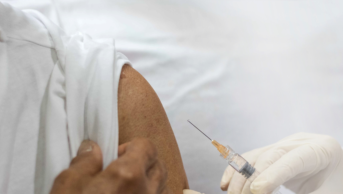
Shutterstock.com
Open access article
The Royal Pharmaceutical Society has made this article free to access in order to help healthcare professionals stay informed about an issue of national importance.
To learn more about coronavirus, please visit: https://www.rpharms.com/resources/pharmacy-guides/wuhan-novel-coronavirus

Until specific guidance is provided, pharmacies will be uncertain of how much vaccine stock they will need to order ahead of the 2020/2021 flu season
Community pharmacies could have just a third of their previous capacity to deliver flu vaccinations during winter 2020/2021 as a result of COVID-19 infection control measures, the pharmacy vaccination lead for London has said.
Speaking to The Pharmaceutical Journal, Rekha Shah, chief executive of Kensington, Chelsea and Westminster Local Pharmaceutical Committee, said that the ongoing COVID-19 pandemic will likely require pharmacists to change their apron and gloves “at a minimum” between patients when giving flu vaccinations.
“Then you’ll have to disinfect the surfaces between [vaccinating] patients,” she said, adding that the time taken to do this “means our capacity might be reduced in terms of how many people we can vaccinate in a day, compared to what we were doing before”.
“Say you were going to do 50 [flu vaccinations per day] — we’re talking about one third of that,” she said, adding that the numbers would depend on government requirements for the service.
Her comments come as the Pharmaceutical Service Negotiating Committee (PSNC) said pharmacies should expect a “greater demand” for flu vaccines in winter 2020/2021 from all eligible cohorts.
In May 2020, the government said in a letter to community pharmacies that it was considering expanding the eligibility criteria for the NHS-funded flu vaccination programme in 2020/2021 and warned of the likelihood of “co-circulation of COVID-19 and flu”.
Shah said a second spike in COVID-19 would mean “no chance of getting [flu] vaccinations done as well” and added that pharmacies were still awaiting further details on how the flu vaccination programme will proceed in 2020/2021.
“Until we get more information about the service specification — the expectations and the funding — it is very, very difficult to tell our pharmacies what it is they need to start doing and ordering,” she said.
While consultation rooms would usually have been cleaned between patients during a vaccination clinic, Shah said she was expecting to have to take disinfection measures that are “way above normal”, including using ‘foggers’ that spray hypochlorous acid solutions.
Shah said one fogger for one consultation room would be expected to cost approximately £1,000 and called for the cost of these types of disinfection measures to be included in funding for the programme.
Nat Mitchell, pharmacist and director at JWW Allison and Sons pharmacy in Cockermouth, Cumbria, said he was “still undecided about how we will proceed” with flu vaccinations.
“I’ve been thinking about insisting patients wear masks, which I think they should have to provide themselves unless funding and/or a route into a reliable supply chain is given to pharmacy,” he said, adding that he would wear his own personal protective equipment (PPE).
“I’d like to see more flexibility in the regulations to allow us to innovate a bit more,” he added. “This is with regards to paperwork and the location of the service being streamlined [or] relaxed somewhat.”
Simon Dukes, chief executive of the PSNC, said that take up of the flu vaccine within eligible cohorts “will be greater because of awareness of how communicable illnesses and flu can affect society”.
“Inevitably, we will see greater demand,” he said. “But the challenge to community pharmacy is — in our business model — how do we deliver on that?”
Allowing patients to walk into a community pharmacy for a flu vaccine at their convenience “has its challenges in a world where a pharmacist has to don PPE in order to vaccinate and then presumably take the PPE off to do their other duties, to then re-garb to perform another vaccination”.
“We’ve got to think about our model and how we can vaccinate more at scale to make sure that we participate as fully as we can in a vaccination programme that will inevitably be larger than usual,” Dukes said, adding that the PSNC is in talks with NHS England about guidance for the profession “and, of course, the financial aspects as well”.
The Pharmaceutical Journal has approached NHS England for comment.


